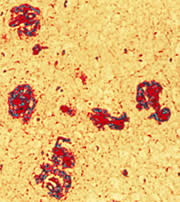Drug treatment for manic depression may prevent brain degeneration

Tau fibers from "flutters" (in red) in the brain with Alzheimer's
Lithium, a common treatment for major depression, may also help delay Alzheimer's disease. A new study reveals that patients who took the drug to stabilize their mood disorder had less dementia.
Over the past 30 years, lithium has been used to control mood swings in patients with bipolar disorder, also known as manic depression. However, over the past decade, a better understanding of the drug's mechanism of action has broadened its range of use. Researchers now think that this simple salt (lithium) can slow the progression of brain cell degeneration in diseases such as Huntington's and Alzheimer's.
Paula Nuance and colleagues from the University of Sao Paulo, Brazil, studied 74-year-olds with manic depression. 4% of those treated with lithium develop Alzheimer's disease, while 21% of those who do not receive lithium develop Alzheimer's disease.
The researchers concluded that drug treatment with lithium may reduce the risk of developing Alzheimer's disease. They presented their data last week at the 9th International Conference on Alzheimer's Disease and Related Diseases, held in Philadelphia, Pennsylvania.
"The numbers are low, so it's hard to draw clear conclusions," says Alzheimer's researcher Bart de Strooper from the University of Leuven, Belgium. However, the results back up studies conducted on tissue cultures and studies conducted on animals, which indicate that lithium can reduce two prominent signs of Alzheimer's, aka tangles and plaques.
Tangles are spaghetti-like fibers of a protein called tau. The accumulation of fibers in the cell makes it difficult for it to function properly.
When mice with tangles are treated with lithium for 5 months, the levels of the tau protein in the brain are drastically reduced, as reported by the group of Takashi Ishihara from Okima University in Japan.
The members of the group think that lithium works by blocking the activity of an enzyme called GSK-3. In Alzheimer's brains, GSK-3 appears to catalyze the addition of phosphate molecules to the tau protein, causing tangles to form. Lithium may prevent the formation of tangles in this way.
Lithium also helps get rid of plaque in rodent brains. Plaque is a deposit of insoluble proteins that accumulates around neurons and thus impairs their ability to communicate. In genetically modified mice with a tendency to form plaque, lithium, which blocks GSK-3, prevents the accumulation of proteins and reduces the amount of plaque.
Today, drugs for Alzheimer's disease are desperately needed. About 18 million people worldwide suffer from dementia, and the chances of developing Alzheimer's, the most common form of dementia, increase rapidly with age. Half of the population over the age of 85 shows symptoms of Alzheimer's.
Most drugs treat the symptoms of insanity rather than eradicating the disease itself. But lithium, or drugs similar to it, can attack the basic changes that occur in the brain that cause the disease, and prevent them.
Lithium itself may not be suitable for elderly patients, according to Ishohara. Long-term treatment may cause nausea, vomiting, diarrhea and chills, which may be intolerable in elderly patients. Therefore, many pharmaceutical companies are working on developing lithium-like drugs that inhibit GSK-3, but lack the most serious side effects.
Translation: Gilat Simon
Link to the article on the Nature website
An article from the journal Nature,
Published online: 27 July 2004

One response
Cool..